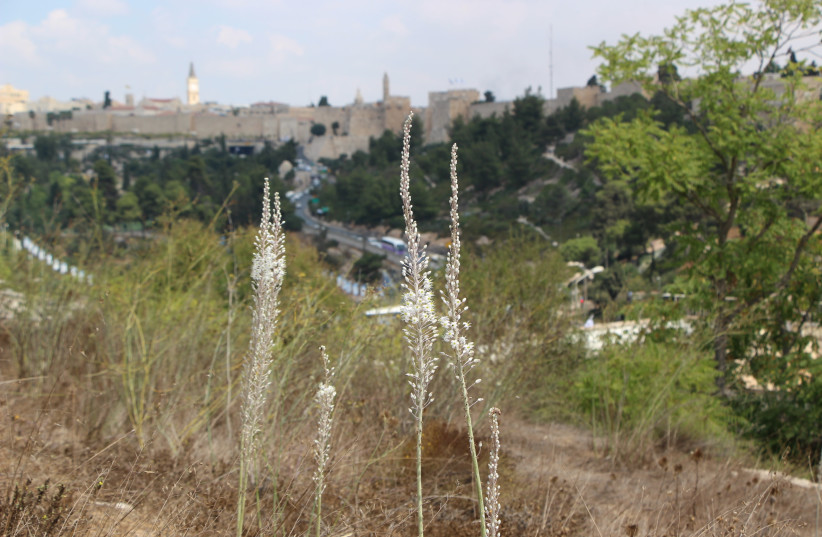
Burning questions have arisen anew about the interplay of Jerusalem and construction.
With the flood of towers changing the Holy City’s skyline, will a new plan further impact the capital’s special character, with picturesque neighborhoods such as Rehavia and Talbiyeh becoming construction sites for additional high-rises at the expense of longtime residents?
Why and for whom is it necessary to destroy yet another coveted corner of the city, Bible Hill (Givat Hatanach), next to the Scottish church, near the First Station, to build a 20,000-square-meter hotel and commercial center? Is there no other place to construct luxury hotels that, considering the security situation, might remain deserted?
Mayor Moshe Lion’s initial reaction: “This is a privately owned lot intended for public buildings.”
Moreover, this week we were informed that the Israel Land Authority (ILA) is issuing a tender for construction on the Massua slopes, below Hadassah Medical Center. According to the tender, the area’s zoning will be changed from a public forest to residential zoning.

Who will finally put limits on the changes to Jerusalem on such a grand scale?
How will the necessary balance be struck between the need to develop the country’s largest city to efficiently accommodate its ever-growing population while preserving its storied character?
A statement by the Council for Conservation of Heritage Sites in Jerusalem (established in 1984 by SPNI) condemned the initiative, calling Bible Hill “a rare monument for preservation, which is in danger of being damaged as a result of the predatory real estate initiative. The new building involves uprooting about 50 ancient trees, which have a dramatic presence in the public space. The hotel building ‘suffocates’ the citadel monument itself, as well as the Scottish church east of it. This is a plan that amounts to profit for a private entrepreneur at the expense of the city’s heritage and its residents.”
The mayor announced about a month ago that he opposes the Massua plan and would do everything in his power to freeze it. Deputy Mayor Yossi Havilio, a candidate in the upcoming mayoral election, first criticized Lion for the “destruction of heritage for financial gain,” later shifting his focus and issuing an unequivocal statement opposing the plan.
Lion told In Jerusalem, “Though the plan that was submitted in Givat Hatanach refers to a private property, in view of the great public sensitivity, including international considerations and high value [to the church], the municipality will oppose the promotion of a construction plan in Givat Hatanach.” Yet, authorities have continued to promote the plan.
TO ROUND out the picture: Meet Gary Barnett. A Jewish-American land developer, he last year purchased land formerly owned by the Greek Patriarch in Rehavia, Talbiyeh, and Nayot for NIS 750 million. Barnett intends to develop several pinui-binui projects, and many residents now fear they might be chased out of their homes.
Barnett said he has started talks with authorities about city development and urban renewal plans, as “the company’s ambition is to reach a fair and permanent agreement with the various tenants in order to promote pinui-binui projects on the purchased land. The company intends to conduct negotiations with all parties involved, and in particular with tenants, to find a comprehensive and fair solution, which may include the signing of sales agreements and transfer of ownership.”
Lion told In Jerusalem that he intends to participate in finding a solution for the tenants.
“I have already contacted the KKL-JNF and the government. As long as they work in favor of a solution that does not come at the expense of the tenants, they will find active partners in the Jerusalem Municipality and in myself, with ability and influence on their side.”
A Fair Lease, an organization representing the tenants, charged that KKL-JNF and the municipality were dividing Jerusalem up to the highest bidders. Lion continued to insist he would stand up for tenants’ rights and do everything legally possible to prevent the promotion of construction plans in the area.
“This is a national question and not a question of a normal property right. The Jerusalem Municipality will act to protect the rights of the tenants,” he affirmed.
As for the ILA’s project to build on the slopes around Hadassah, Safra Square announced earlier this week that it will not allow any building there, no matter who is interested in promoting it, and how much it involves.
Thus, there appears to be budding awareness at Safra Square that construction plans are not the only thing deserving of the municipality’s support. This could be short-lived due to current pre-election activity. It remains to be seen how Jerusalemites will react on election day, February 27. ■
What else is new In Jerusalem?
OurCrowd CEO talks Zionism, optimism, and changing the world
Old City of Jerusalem's Armenian photo shop stands the test of time
Jerusalem hotel gives evacuees fleeing Hamas, Hezbollah new swimwear
